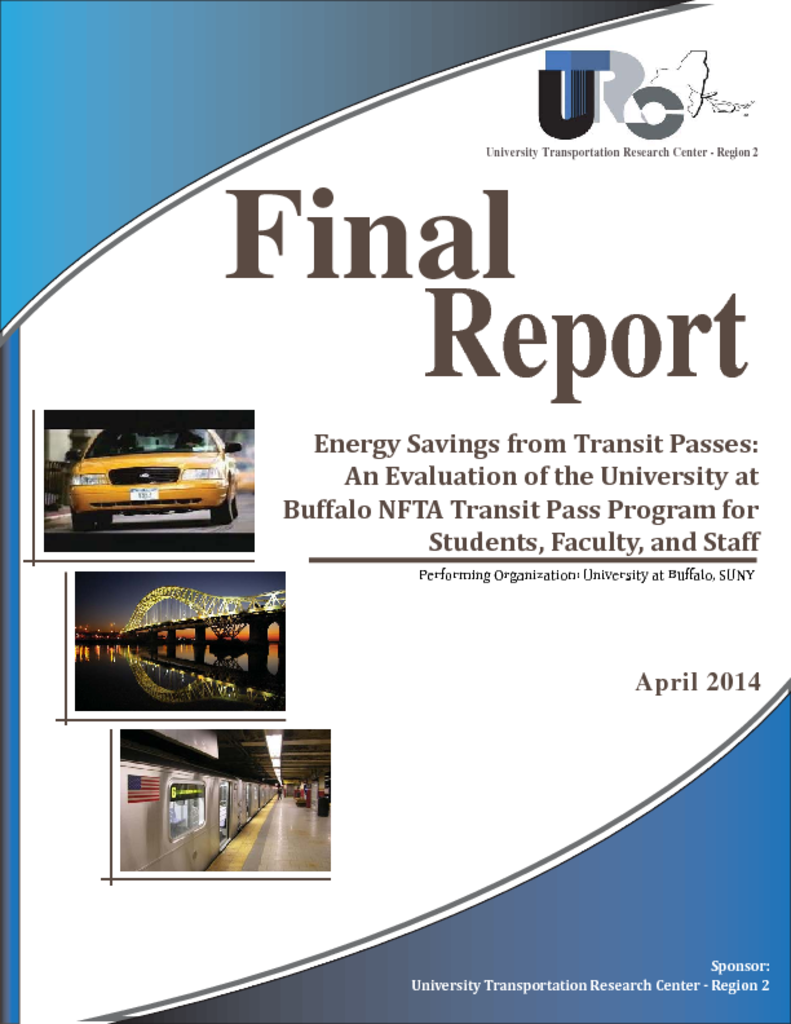The University Transportation Research Center – Region 2 supported a study entitled “Connections Beyond Campus: An Evaluation of the Niagara Frontier Transportation Authority – University at Buffalo Transit Pass Program”. Unlimited Access transit passes have become common sustainability programming at many colleges and universities in cities both large and small across the United States. In 2010, the University at Buffalo (UB), in partnership with the Niagara Frontier Transportation Authority (NFTA), established a pilot program to provide select students, faculty, and staff with unlimited prepaid use of the NFTA Metro Rail, a 6.2 mile light-rail rapid transit system which connects Downtown Buffalo and UB’s South Campus and the neighborhoods between the two. Though other colleges and universities in Buffalo have been providing transit passes to students at their institutions since 2003, this was the first time in which the UB, the region’s largest institution of higher education with 28,600 students, entered into a transit pass agreement with the NFTA.
The UB-NFTA Pilot Transit Pass Program concluded after 20 months at the end of the summer 2012 session. Overall, 1,923 students and 300 faculty and staff took part in the program. As the program concluded, it was not officially evaluated by UB. This report seeks to evaluate the effectiveness of the program in a number of focus areas, including the cost of the program to the parties involved, and also the benefits obtained both by the participating organizations and by individual transit pass users. This is accomplished through the use of both qualitative and quantitative analysis of the results of a university-wide survey conducted by the research team in April 2013.
The analysis of this project revealed many expected and unexpected results. Some users of the transit pass were new Metro Rail riders, and some previously paid their own fares. The UB-NFTA transit pass was underpriced, which benefited UB and led to lost revenue for the NFTA throughout the course of the program. The program allowed 72 survey respondents to cease owning a vehicle, and 179 respondents to delay owning a vehicle, effectively reducing the cost of a UB education by thousands of dollars a year for participants who could utilize Metro Rail to commute to campus in place of an automobile. The UB-NFTA Pilot Transit Pass Program increased transportation choices and for the first time provided university community members a transportation subsidy which did not take the form of a parking space. UB officials have stated, however, that the intent of the UB-NFTA transit pass program was to provide a link between the South and Downtown campuses, and was not to serve as a commute subsidy.
The UB-NFTA Pilot Transit Pass program had the potential to change modes of travel for students, faculty, and staff to the three UB campuses, and did for a short period of time, even if it was done unintentionally. Many survey respondents reported that widening their travel options, using public transit more, driving less, and reducing their carbon footprints were important personal benefits of the pilot transit pass program.
UB’s pilot transit program provided many benefits to community members, from increased access to new destinations and housing, to reduced demand for parking. The design of a permanent UBNFTA transit pass program, if an agreement is reached in the future, should help the NFTA mitigate lost revenue from pass holders, and should be understood as a means for UB to reduce future capital expenses and greenhouse gas emissions. Additionally, in creating a sustainable transportation system to serve its campuses, UB must carefully consider the equity implications of its existing parking and transportation fee structure, which in its current form incentivizes driving and penalizes public transit users and non-motorized travelers.


